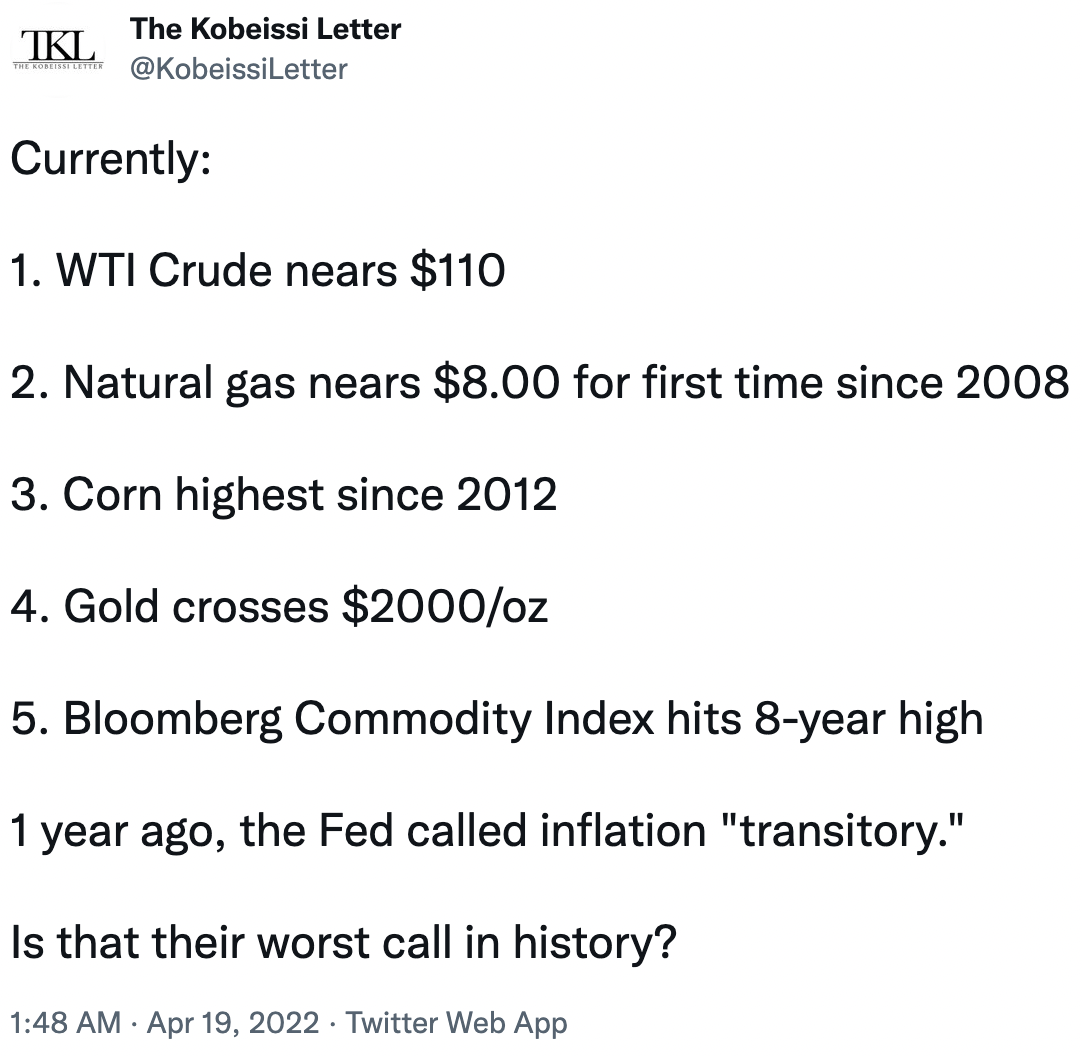Is predicting inflation's peak a fruitless exercise?
Transitory was the macro word of 2021 as the Federal Reserve and other major central banks attempted to calm markets about the pace of inflation. Investors fought back by aggressively selling off bonds around the world, buying volatility indices and – unusually – not taking an ounce of interest in gold.
In this case, the market seems to have been proven right and inflation across most of the major G10 nations is well past the target bands of those central banks.
Think about it – it took until a headline inflation print of 8.5% in the US to cause the Federal Reserve to start quantitative tightening and the hiking of interest rates. Further out the curve, the Bank of Canada hiked rates by 50 basis points in mid-April, after a 5.7% aggregate price rise in March.
Explaining the terminal rate
Now that rate hikes are squarely on central bank agendas, the question being posed by market analysts is when will peak demand destruction hit? Some say we will know the peak by evaluating what the terminal rate is.
The terminal rate – sometimes known as the natural or neutral interest rate - is the figure consistent with full employment, capacity utilisation, stable prices.
The economists' view
At the moment, forward projections of the terminal rate are wide and varied in Australia. Westpac's chief economist Bill Evans sees the interest rate target peaking out at 2% but not until mid-2023 in this cycle.

The Commonwealth Bank team are on the bottom end of the scale with a much more muted 1.25% prediction for neutral.

In the US – the views are even more varied. CME Group and ING data suggests traders think the Federal Reserve's terminal rate is a much punchier 2.7%. If you back St Louis Fed President James Bullard's view, you probably think the terminal rate will be much closer to 3.5%. If you back the even more academic Taylor Rule, the rate would be even higher than that.
The fund manager's take
So what is the magic number? Mathan Somasundaram from Deep Data Analytics argues the answer isn't to look for a number.
Mathan thinks investors are moving into a cycle dominated by a weakening growth outlook and bad management by central banks.
"We are likely to move into deleveraging cycle and weaker growth. Most people have never invested in this type of cycle and even the people that have, never seen this level of market manipulation," Mathan says.
Global monetary authorities - including the Reserve Bank here at home - have previously flagged they would be happy to let inflation run hot so long as other policy goals are met.
Even in the RBA's March meeting minutes today, the board said "important additional evidence" will only come "over coming months". While it's rare for Martin Place to move the cash rate in an election campaign, this time is very different.
Mathan says he is positioning for a succession of "mini cycles" - making sector selection and timing doubly important.
Mathan's top calls
So where should you invest? Mathan tells us he continues to like the gold miners including Northern Star (ASX:NST), Regis Resources (ASX:RRL), Gold Road Resources (ASX:GOR) and Silver Lake Resources (ASX:SLR).
However, not all miners are created equal - and Mathan says he's holding onto the iron ore miners at present but would look to buy more on a pullback.
Mathan has also been a food inflation/agribusiness bull for some time - buying names like Incitec Pivot (ASX:IPL), Nufarm (ASX:NUF) and Elders (ASX:ELD).
Finally, rising yields and interest rates mean now is the perfect time for a look at non-bank plays like IAG (ASX:IAG), QBE (ASX:QBE) and Challenger Financial (ASX:CGF).
A final thought
One tweet to mull on before we go. Mathan is not alone on his views around predicting peak inflation. Take this tweet from The Kobeissi Letter about how asset prices have changed since the Federal Reserve first projected inflation would be "transitory".

One year on, markets aren't talking about transitory price increases but a permanent policy error. Only time and good fortune will tell whether monetary policy officials will get it right.
Never miss an insight
If you're not an existing Livewire subscriber you can sign up to get free access to investment ideas and strategies from Australia's leading investors.
I'll be in charge of asking the questions to Australia's best macro strategists, economists and fixed income fund managers. If you have questions of your own or guests we should chat to, flick us an email: content@livewiremarkets.com.
5 topics
10 stocks mentioned
1 contributor mentioned

